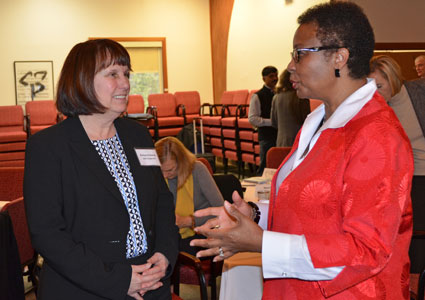Healthy Aging Summit draws global experts to discuss issues related to an aging population
Feb. 17, 2014
The Gillings School of Global Public Health’s inaugural “Healthy Aging in Place through Technology” summit was held Feb. 10 at Carol Woods Retirement Community in Chapel Hill, N.C.

Dr. Peggye Dilworth-Anderson, professor of health policy and management (right), chats with Dr. Barbara Entwisle, UNC’s Kenan Distinguished Professor and Vice Chancellor of Research.
More than a year in the planning, the conference brought together experts from around the world to share their research and perspectives on the ways promising technologies could help older people and their families remain healthy, active, independent and engaged throughout their lives.
By 2020, an unprecedented global demographic shift will result in more people being older (65 years of age or more) than are young (under age five). Around the world, the reasons are manifold, including the migration of young workers to countries offering better job prospects; the decimation of young adults from HIV/AIDS in some countries; and policies such as China’s longtime one-child-only directive. In the U.S., the rising number of immigrants and working poor adds to the complexity of meeting the needs of older adults in our evolving health-care system.
The conference, co-sponsored by the Gillings School, Carol Woods Retirement Community, the University of Cambridge (U.K.) and MIT AgeLab (Cambridge, Mass.), aimed to address these urgent age-related issues, particularly how to:
- Develop a workforce empowered to use technology to improve social connections, functionality and quality of life of aging people and their caregivers;
- Develop new types of jobs and career ladders that fully leverage new technologies to make working with older adults an attractive career choice;
- Use technology to redress health inequalities and caregiver shortages, particularly in rural areas;
- Develop standards to evaluate products and services;
- Ensure that consumers drive choice and implementation of innovations;
- Change messaging, concentrating on issues that are meaningful and engaging to people of all ages, such as fun, entertainment and social interactions with friends; and
- Mobilize the collective knowledge and ambition of a diverse group of experts.
Several dozen attendees from the private and public sectors interacted with presenters, who included:
- Majd Alwan, PhD, senior vice president of technology and executive director, LeadingAge Center for Aging Services Technologies;
- Jane Barratt, PhD, Secretary General, International Federation of Ageing, Canada;
- Carol Brayne, MD, MSc, FFPH, FRCP, FRSA, director, University of Cambridge Institute of Public Health; professor of public health medicine, Department of Public Health and Primary Care, Institute of Public Health;
- Joseph Coughlin, PhD, director, Massachusetts Institute of Technology (MIT) AgeLab;
- Peggye Dilworth-Anderson, PhD, professor of health policy and management, Gillings School of Global Public Health, and interim co-director of UNC’s Institute on Aging;
- Peter Gore, MEng, Professor of Practice (Ageing and Vitality), Newcastle University; Founder of ADL Smartcare, Newcastle Initiative on Changing Age;
- Jim Johnson, PhD, Distinguished Professor of Strategy and Entrepreneurship, UNC Kenan-Flagler School of Business; director, Urban Investment Strategies Center, Frank Hawkins Kenan Institute of Private Enterprise;
- Mike Kafrissen, MD, MSPH, chief executive officer, STE Health International LLC; research scientist, Massachusetts Institute of Technology (MIT) Agelab;
- Leslie Lytle, PhD, chair and professor of health behavior, Gillings School of Global Public Health;
- Mary Palmer, PhD, Umphlet Distinguished Professor in Aging at UNC’s School of Nursing and interim co-director of UNC’s Institute on Aging;
- Tom Ricketts, PhD, professor of health policy and management, Gillings School of Global Public Health;
- Barbara K. Rimer, DrPH, dean and Alumni Distinguished Professor, Gillings School of Global Public Health;
- Ilene Siegler, PhD, MPH, professor, Duke University;
- Katie (Katrinka) Sloan, MPA, chief operating officer and senior vice president, LeadingAge; and
- Patricia Sprigg, MS, president and chief executive officer, Carol Woods Retirement Community.
Dean Barbara K. Rimer said she saw the summit as a stellar beginning to the School’s coordinated efforts in the area of global healthy aging.
“We’re excited about our collaborations with the University of Cambridge, MIT’s AgeLab and partners across UNC and around the world,” Rimer said. “Our long-range goal is to contribute meaningfully to research that could lead to better strategies for supporting the physical, emotional and mental health of older populations, along with their independence and financial stability.”
She charged participants to develop criteria for investing in effective, economical and scalable tools and strategies; to strengthen teaching programs so as to be more receptive to the ways technology can support healthy aging; and to develop tools for workforce development to provide support for what likely will be a huge growth area in the coming decade.
“Those who attended our inaugural summit were engaged and energized,” Rimer said, “and I look forward to expanding our efforts.”



